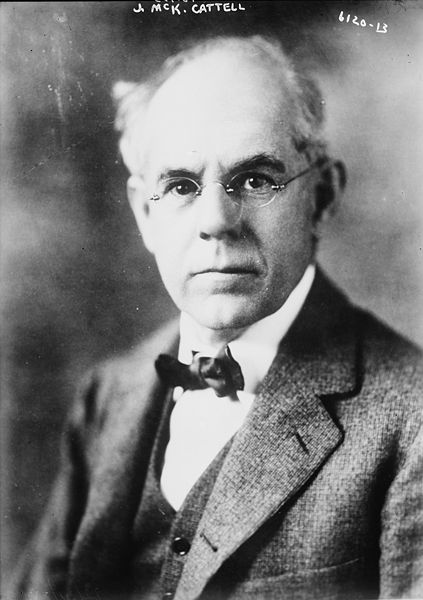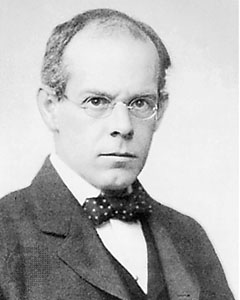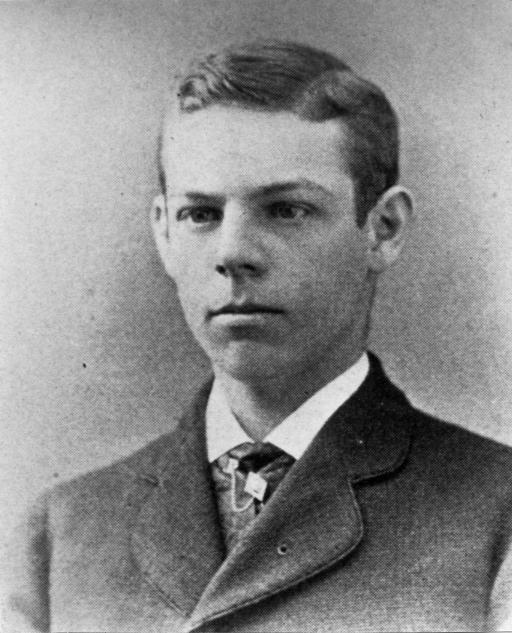<Back to Index>
- Psychologist James McKeen Cattell, 1860
- Writer Robert Ludlum, 1927
- Emperor of the Song Dynasty Shenzong, 1048
PAGE SPONSOR



James McKeen Cattell (May 25, 1860 - January 20, 1944), American psychologist, was the first professor of psychology in the United States at the University of Pennsylvania and long time editor and publisher of scientific journals and publications, most notably the journal Science. He also served on the board of trustees for Science Service, now known as Society for Science & the Public, from 1921 - 1944.
At the beginning of his career, many scientists regarded psychology at best a minor field of study, or at worst a pseudoscience such as phrenology.
Perhaps more than any of his contemporaries, Cattell helped establish
psychology as a legitimate science, worthy of study at the highest
levels of the academy. At the time of his death, the New York Times hailed
him as "the dean of American science." Yet Cattell may be best
remembered for his uncompromising opposition to American involvement in World War I. His public opposition to the draft led to his dismissal from his position at Columbia University, a move that later led many American universities to establish tenure as a means of protecting unpopular beliefs. Born in Easton, Pennsylvania, in 1860, Cattell grew up the eldest child of a wealthy and prominent family. His father, William Cassady Cattell, a Presbyterian minister, became president of Lafayette College in
Easton, Pennsylvania, shortly after James' birth. William Cattell could
easily provide for his children, as he had married Elizabeth "Lizzie"
McKeen in 1859; together they shared Lizzie's substantial inheritance.
To this picture of the family's success one could add political power
as well, as James' uncle Alexander Gilmore Cattell represented New Jersey in the United States Senate. Cattell
entered Lafayette College in 1876 at the age of sixteen, and graduated
in four years with the highest honors. In 1883 the faculty at Lafayette
awarded him an M.A., again with highest honors. Despite his later
renown as a scientist, he spent most of his time devouring English literature, although he showed a remarkable gift for mathematics as well. Cattell did not find his calling until after he arrived in Germany for graduate studies, where he met Wilhelm Wundt at the University of Leipzig. Cattell left Germany in 1882 to study at Johns Hopkins University, but returned to Leipzig the
next year as Wundt's assistant. The partnership between the men proved
highly productive, as the two helped to establish the formal study of intelligence. Under Wundt, Cattell became the first American to publish a
dissertation in the field of psychology. The title of his German dissertation was Psychologische Untersuchungen (Psychometric Investigation).
The dissertation was accepted by the University of Leipzig in 1886.
More controversially, Cattell tried to explore the interiors of his own
mind through the consumption of the then - legal drug hashish. Under the influence of this drug, Cattell once compared the whistling of a schoolboy to a symphony orchestra. While recreational drug use was not uncommon among early psychologists, including Freud, Cattell's experimentation with hashish reflected a willingness to go against conventional opinion and morality. The main street in the College Hill Neighborhood of Easton, Pennsylvania, home to Lafayette College, is named after Cattell. After
completing his Ph.D. with Wundt in Germany in 1886, Cattell took up a
lecturing post at the University of Cambridge in England, and became a
'Fellow Commoner' of St John's College, Cambridge. He made occasional visits to America where he gave lectures at Bryn Mawr and the University of Pennsylvania. In 1889 he returned to the United States to take up the post of Professor of Psychology in Pennsylvania, and in 1891 moved to Columbia University where he became Department Head of Psychology, Anthropology, and Philosophy; He became President of the American Psychological Association in 1895. From
the beginning of his career, Cattell worked hard to establish
psychology as a field as worthy of study as any of the "hard" physical
sciences, such as chemistry or physics. Indeed, he believed that
further investigation would reveal that the intellect itself could be
parsed into standard units of measurements. He also brought the methods
of Wilhelm Wundt and Francis Galton back to the United States, establishing the mental testing efforts in the U.S. In
1917, Cattell was fired from Columbia University for opposing the
United States’ conscription policy during World War I. Years later he
sued the university and won an annuity. In 1921, he used the money that
he had gained from the settlement in order to start The Psychological Corporation to
foster his interest in the field of applied psychology. Because he was
never able to really explain how psychologists can apply their work,
the organization failed until taken over by other psychologists who had
experience in applied psychology. Towards the end of his life, Cattell
still edited and published his journals. To help himself in the
process, he created the Science Press Printing Company in order to
produce his journals. He continued his work on the journals until his
death in 1944 in Lancaster, Pennsylvania.
Cattell
is well known for his involvement in creating and editing scientific
journals. He was so involved in owning and publishing journals, that
his research productivity declined. He founded the journal Psychological Review in 1894 along with James Mark Baldwin. He also acquired the journal Science and,
within five years, made it the official publication of the American
Association for the Advancement of Science, 1895 - 1900. In 1904, he also
founded Popular Science Monthly, which later became Popular Science. In 1915 he founded and edited Scientific Monthly.